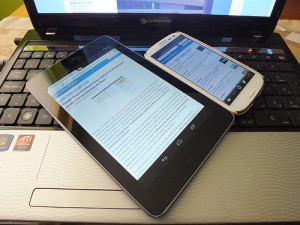 A proposal by the Federal Communications Commission could usher in an age of powerful Wi-Fi networks across the country, capable of allowing consumers to make calls or use the Internet without the need for a mobile provider. This idea isn’t new, however. According to TheHill.com, the FCC voted last year to institute a plan that encouraged television stations to auction off their portion of the spectrum that carries wireless signals. As before, this modern proposal would by available at auction.
A proposal by the Federal Communications Commission could usher in an age of powerful Wi-Fi networks across the country, capable of allowing consumers to make calls or use the Internet without the need for a mobile provider. This idea isn’t new, however. According to TheHill.com, the FCC voted last year to institute a plan that encouraged television stations to auction off their portion of the spectrum that carries wireless signals. As before, this modern proposal would by available at auction.
This iteration of the proposal has shaken the wireless industry, who has begun a push to lobby against the idea, particularly for unlicensed use. According to the Washington Post, FCC Chairman Julius Genachowski would like to mandate a section of the available spectrum for the next generation of Wi-Fi, which would greatly increase speed and range.
Are Mobile Providers Fighting Against the Idea?
Normally, a standard auction would guarantee that the spectrum be divided between cell and Internet providers AT&T and Verizon. However, many broadband advocates and Democrats are lobbying behind Chairman Genachowski’s proposal in an effort to support competition, and many support the idea of these frequencies being set aside for unlicensed use. According to Popular Science, Both Google and Microsoft are also lending their weight to the proposal, suggesting that eventually free national Wi-Fi access could create a nation of networked devices.
The FCC has explored the myriad uses of an unlicensed spectrum, which is the series you can operate within without obtaining a license. This includes such technology as baby monitors, Wi-Fi devices, and cordless telephones. The FCC suggests in a published summary of the proposal that by extending the spectrum into unused TV channels, they could offer the next generation of Wi-Fi products to provide wireless broadband for entire communities, especially those in rural or isolated locations.
If a New Version of WIFI Existed
The implications to current Internet providers are threatening, and the benefit to average users is staggering. If a new version of Wi-Fi existed that was capable of blanketing entire neighborhoods, any group could launch free Wi-Fi services by sharing their connection altruistically with others. If such a technology allowed those accessing it to “jump” from any Wi-Fi connection in the way cellular sites do, data plans could become obsolete. Surely, Internet providers would stand to make tremendous gains by such technological advancement while mobile providers could lose potential billions in possible revenue from data plans and networks.
Some businesses are already implementing free Wi-Fi structures that such a technological leap could generate profitable results. Virgin America has teamed up with Google to offer free Wi-Fi on flights, allowing guests to use Internet without additional charge and has seen a large growth in customers logging on since the implementation of this network. Cloud computing services also stand to gain from such a tech shift, since they offer capabilities that are oftentimes difficult to deliver locally. According to Network World, the biggest general benefit to cloud computing is that any business can now have access to the best wireless solutions.
Photo by Flickr user miniyo73
![Herbal Reference Substances are Key to Everyday Products <!-- AddThis Sharing Buttons above -->
<div class="addthis_toolbox addthis_default_style " addthis:url='http://newstaar.com/herbal-reference-substances-are-key-to-everyday-products/3512112/' >
<a class="addthis_button_facebook_like" fb:like:layout="button_count"></a>
<a class="addthis_button_tweet"></a>
<a class="addthis_button_pinterest_pinit"></a>
<a class="addthis_counter addthis_pill_style"></a>
</div>When it comes to quality control testing and the development of new products, Botanical Reference Materials (BRMs), also known as Herbal References are critically important. To help companies ultimately obtain all-important FDA approval, the Food and Drug Administration provides in its guidance a recommendation that […]<!-- AddThis Sharing Buttons below -->
<div class="addthis_toolbox addthis_default_style addthis_32x32_style" addthis:url='http://newstaar.com/herbal-reference-substances-are-key-to-everyday-products/3512112/' >
<a class="addthis_button_preferred_1"></a>
<a class="addthis_button_preferred_2"></a>
<a class="addthis_button_preferred_3"></a>
<a class="addthis_button_preferred_4"></a>
<a class="addthis_button_compact"></a>
<a class="addthis_counter addthis_bubble_style"></a>
</div>](http://newstaar.com/wp-content/uploads/2021/02/Achillea_millefolium_flowers-100x100.jpg)
![Quality Electrochemical Biosensors are Critical for Medical, Food and Chemical Industry <!-- AddThis Sharing Buttons above -->
<div class="addthis_toolbox addthis_default_style " addthis:url='http://newstaar.com/quality-electrochemical-biosensors-are-critical-for-medical-food-and-chemical-industry/3512086/' >
<a class="addthis_button_facebook_like" fb:like:layout="button_count"></a>
<a class="addthis_button_tweet"></a>
<a class="addthis_button_pinterest_pinit"></a>
<a class="addthis_counter addthis_pill_style"></a>
</div>A number of industries have, at their core, a need to frequent or even continuous analysis of biological media. These include the medical and pharmaceutical fields, biotech firms, and food and chemical companies. To maintain quality standards and develop new products, these industries rely heavily […]<!-- AddThis Sharing Buttons below -->
<div class="addthis_toolbox addthis_default_style addthis_32x32_style" addthis:url='http://newstaar.com/quality-electrochemical-biosensors-are-critical-for-medical-food-and-chemical-industry/3512086/' >
<a class="addthis_button_preferred_1"></a>
<a class="addthis_button_preferred_2"></a>
<a class="addthis_button_preferred_3"></a>
<a class="addthis_button_preferred_4"></a>
<a class="addthis_button_compact"></a>
<a class="addthis_counter addthis_bubble_style"></a>
</div>](http://newstaar.com/wp-content/uploads/2020/10/Electrochemical-Biosensor-100x100.jpg)
![Company Develops Industrial Mixers Well-Suited for both Fragile and Explosive Products <!-- AddThis Sharing Buttons above -->
<div class="addthis_toolbox addthis_default_style " addthis:url='http://newstaar.com/company-develops-industrial-mixers-well-suited-for-both-fragile-and-explosive-products/3512071/' >
<a class="addthis_button_facebook_like" fb:like:layout="button_count"></a>
<a class="addthis_button_tweet"></a>
<a class="addthis_button_pinterest_pinit"></a>
<a class="addthis_counter addthis_pill_style"></a>
</div>Industrial drum mixers are normally applied to blend mixes of varying viscosities such as adhesive slurries or cement. Some of these mixers have the capability of blending mixes of very different particle sizes such as fruit and ice cream, and gravel and cement slurry. The […]<!-- AddThis Sharing Buttons below -->
<div class="addthis_toolbox addthis_default_style addthis_32x32_style" addthis:url='http://newstaar.com/company-develops-industrial-mixers-well-suited-for-both-fragile-and-explosive-products/3512071/' >
<a class="addthis_button_preferred_1"></a>
<a class="addthis_button_preferred_2"></a>
<a class="addthis_button_preferred_3"></a>
<a class="addthis_button_preferred_4"></a>
<a class="addthis_button_compact"></a>
<a class="addthis_counter addthis_bubble_style"></a>
</div>](http://newstaar.com/wp-content/uploads/2020/06/bandeau-sofragir2-100x100.jpg)